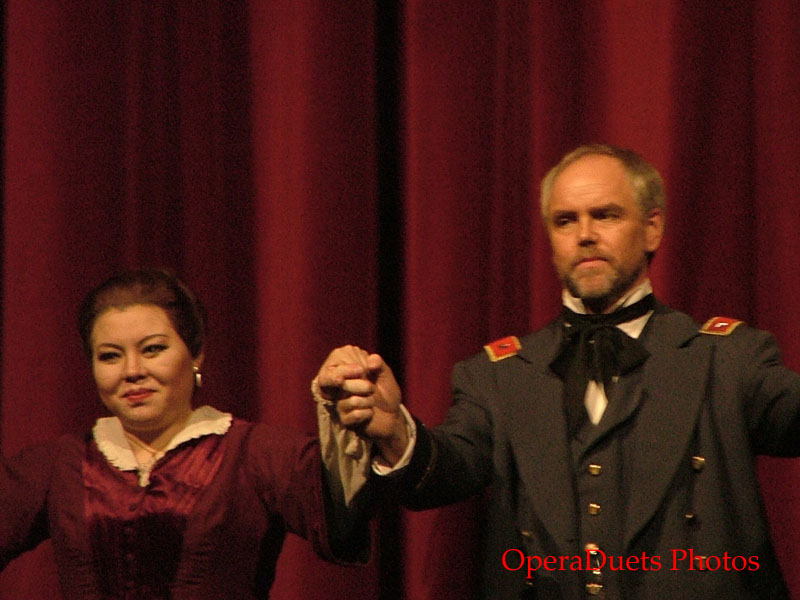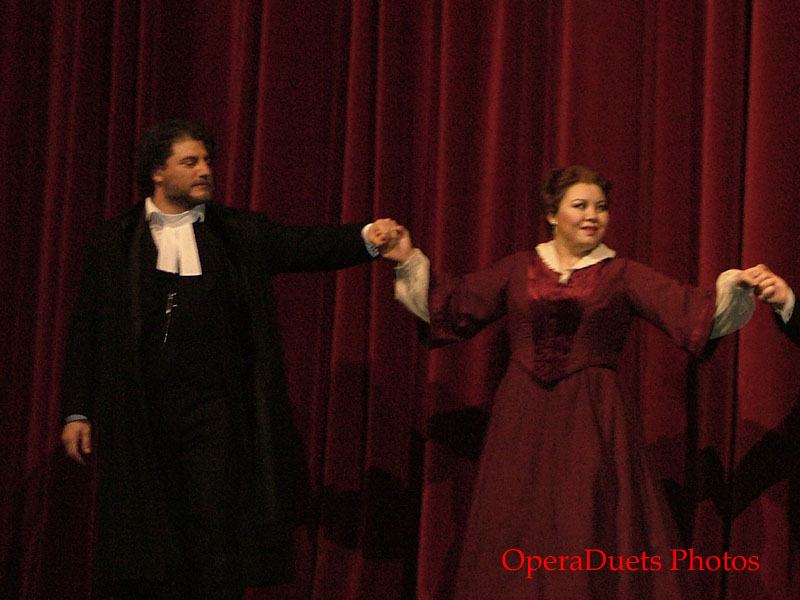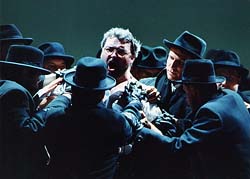2009-02-10 Stiffelio (Verdi), Wiener Staatsoper
Stiffelio = José Cura
Lina = Hui He
Stankar = Anthony Michaels-Moore (a)
Stankar = Mark Rucker (s)
Raffaele = Gergely Németi
Jorg = Alexandru Moisiuc
Federico = Benedikt Kobel
Dorotea = Elisabeta Marin
Michael Halász, conductor
Fault no.1: Anthony Michaels-Moore is onstage acting Stankar, but his name is not in the role lists, no mention of him at all. Fault no 2: Mark Rucker is beside the stage singing the role of Stankar with his notes before him, the role list says he is Stankar, but he is not onstage in costume. Fault no 3: the orchestra under Michael Halasz often sound like there is several orchestra members missing, and the conductor is careless so that the singers suffers, they have to fight to come in right on time.
The singers are wonderful. This Stiffelio seemed to have microphones for the radio broadcast. Saturday that was the superior performance was not broadcast, why? Because of the change in baritone, really?? Bad decision, and then to slight 2 baritones in one (see Fault 1+2). I found the acting of Anthony Michaels-Moore worth mentioning, he is great. But still I was disturbed when I understood that Mark Rucker would not be allowed to act as Stankar. If it was the will of either baritones then I will be content, but if it was the management then I really don't understand it. The audience that had not been there on Saturday was understandably confused. If only they had mentioned Anthony Michaels-Moore. M-M who acted admirably was too ill to be there for all the applause, so why wasn't he allowed to rest. If Mark Rucker would have to do some improvising then I would be sure the rest of the cast would have been up to it.
I have read two reviews of this Stiffelio, both praises the baritone Mark Rucker. One said that Jose Cura was no longer a Tenor Crown Prince, meaning he was no good, I guess. But the all the other got some praise. The other praised all, except Hui He who was too Diva and not Lina. Here both Jose Cura and Hui He are doing their best performances vocally and as actors, but the review doesn't like them. They are so wrong. I am really trying to understand how Jose Cura's singing could be prove that he is no longer good. I think the reviewer must already dislike his choices of how to use his voice for dramatic purposes. I can sometime disagree myself, but not this time. Hui He acting like a Diva, wow, not acting like Lina. What? Should she sing the arias bad, and then ... I really wondered, did we see the same performance?
Stiffelio
(35. Aufführung in dieser Inszenierung)
Dirigent: Michael Halász
Inszenierung: Elijah Moshinsky
Bühnenbild: Michael Yeargan
Kostüme: Peter J. Hall
Lichtregie: Paul Pyant
Choreinstudierung: Thomas Lang
Stiffelio: José Cura
Lina: Hui He
Stankar: Anthony Michaels-Moore
Raffaele: Gergely Németi
Jorg: Alexandru Moisiuc
Federico: Benedikt Kobel
Dorotea: Elisabeta Marin
Beginn: 19.30
Das Wunder Oper - Wiener Zeitung
Staatsoper: Tenor-Kronprinz? Längst gestürzt! - Die Presse
OD Travel + Photos
3 faults by Vienna Staatsoper, but Stiffelio still...
For more reviews from my travels, see www.operaduetstravel.com
If you want to see more photos from my OperaDuets Travels, go to www.operaduetsphotos.com





